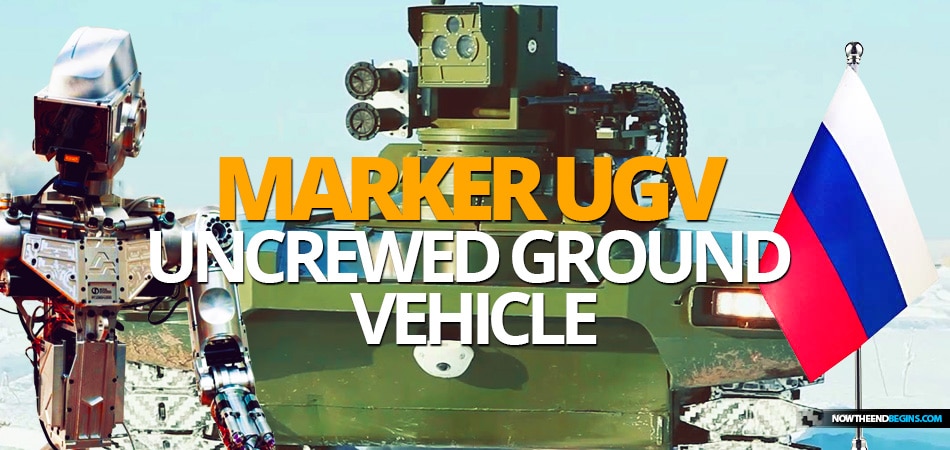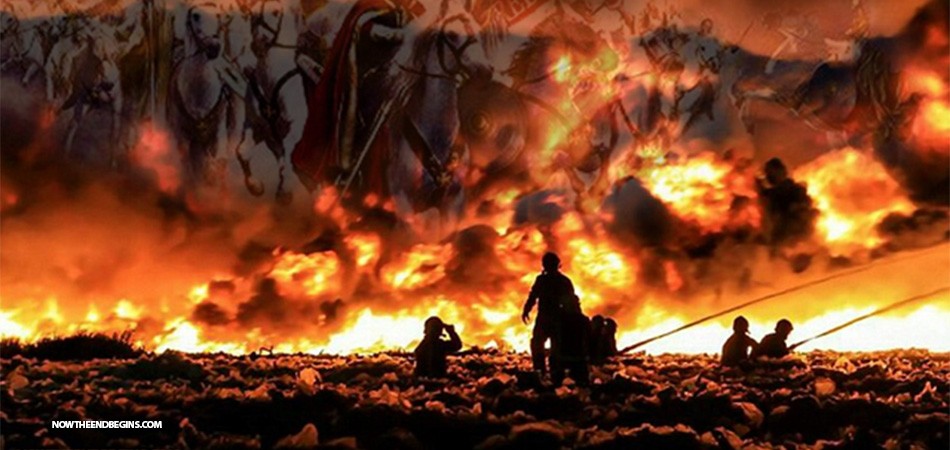
For Russia, the question of robots taking over the role of soldiers on the battlefield is a matter of when, not if. Meet Marker UGV Uncrewed Ground Vehicle Platform.
Russia has been very quiet during the COVID-29 crisis, but they have not been inactive. In fact, Russia has announced creation of a massive robot army as part of a new military system called Marker UGV, which stands for Uncrewed Ground Vehicle. Giving this automated killing system the name of 'Marker' is an interesting unintentional homage to the MARK of the beast from Revelation. But who knows, perhaps it is intentional.
"Therefore, thou son of man, prophesy against Gog, and say, Thus saith the Lord GOD; Behold, I am against thee, O Gog, the chief prince of Meshech and Tubal: And I will turn thee back, and leave but the sixth part of thee, and will cause thee to come up from the north parts, and will bring thee upon the mountains of Israel: And I will smite thy bow out of thy left hand, and will cause thine arrows to fall out of thy right hand." Ezekiel 39:1-3 (KJB)
Ezekiel 39 tells us that during the time of Jacob's trouble, Russia mentioned as Magog will raise up a massive army and ultimately come against Israel, otherwise known as the armies of Antichrist. Could they be robot soldiers? Absolutely they could be, and of what Jesus says about the '
days of Noe' is applied, I would expect some of those soldiers to not only be robotic, but to be Nephilim as well. Don't forget that the days of Noah all began with the very first launch of
Flight #777, with one passenger on board. This time around the
entire plane will be filled.

THE BIBLE BELIEVER’S GUIDE TO THE TWO DIFFERENT WARS AS FOUND IN EZEKIEL CHAPTERS 38 AND 39
Robots Will Replace Soldiers In Combat, Says Russia
FROM FORBES: “Living fighters will gradually begin to be replaced by their robotic ‘brothers’ who can act faster, more accurately and more selectively than people,” Vitaly Davydov told RIA Novosti on April 21. Davydov is the deputy director of Russia's Advanced Research Foundation, its DARPA analog.
Developing robots for war is an international phenomenon, and Davydov’s remarks fall into a broader pattern of Russia seeking to augment its existing military with new, autonomous capabilities.
“There is a still-classified Russia's military robotics road-map that sketches out various stages of Russian unnamed military developments, which undoubtedly has been influenced by Russian military actions and experience in Syria,” says Samuel Bendett, an adviser at the Center for Naval Analyses.
The Ministry of Defence is working on a new generation of combat machines for training and possible future use. At the center of this design is the
Marker UGV, or uncrewed ground vehicle. Resembling a miniature tank with treads and turrets, the Marker is as much a test bed as it is a machine expected to see battle.
“The Ministry of Defence is discussing the eventual use of robotic swarms in combat— and Marker is definitely the platform to test that out,” says Bendett, an Adjunct Senior Fellow at CNAS. “As envisioned, it will be able to launch swarms of UAVs or loitering munitions, making it a truly versatile robotic platform.”
The development parallels many robotic programs under way in the United States. It is remarkable, too, that both nations have hit upon swarms of ground robots as a way to supplement existing human formations in combat. Russia plans to test
swarms of ground robots later in 2020.
Part of Davydov’s argument for military robots is that they will, simultaneously, be faster, more discriminating in target selection, and more accurate than people. While it is already possible for machines to react to sensor data faster than humans, the other parts of that equation require targeting algorithms with far greater discretion than anything seen presently. (It also involves sidestepping the entire
international legal and moral debate over transferring the decision to kill in battle from humans to machines.)
“At this point in military autonomy, a human can designate targets once they are identified,” says Bendett, “but once the computing speed and the levels of battlefield complexity multiply exponentially, I wonder how true Davydov's statement will be.”
Making robotic soldiers that adhere to the laws of war and protections for civilians isn’t just an ethical challenge, it’s a coding challenge. It requires the military to prioritize positive target identification over the fastest possible response.
READ MORE
No comments:
Post a Comment